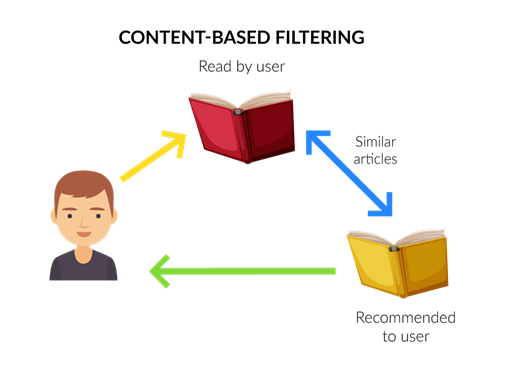#RecommendationEngine
Explore tagged Tumblr posts
Text
𝐇𝐨𝐰 𝐍𝐞𝐭𝐟𝐥𝐢𝐱 𝐊𝐧𝐨𝐰𝐬 𝐖𝐡𝐚𝐭 𝐘𝐨𝐮’𝐥𝐥 𝐖𝐚𝐭𝐜𝐡 𝐍𝐞𝐱𝐭
Recommendation engines are the silent geniuses behind your favorite content. From Spotify to Amazon, these AI systems personalize your world by learning what you love.
In this video, we’ll break down how they work — and why they’re the backbone of the digital age.
Watch https://lnkd.in/g5D_QrPg
Subscribe for more powerful tech breakdowns made simple.
0 notes
Text
🎯 Give your customers exactly what they want!
Our AI-driven Recommendation Engines analyze behavior to personalize content & product suggestions—boosting engagement and conversions. 🚀
0 notes
Text

Explore the journey of recommendation algorithms in e-commerce with our easy-to-follow flowchart. Simplify data analysis, algorithm selection, training, and implementation for personalized shopping experiences. Perfect for e-commerce beginners and enthusiasts. Stay tuned with Softlabs Group for more AI insights!
#Personalization#CollaborativeFiltering#ItemRecommendation#UserPreferenceModeling#RecommendationEngine
0 notes
Text
#ContentRecommendation#AIinContent#MachineLearning#RecommendationEngines#AIAnalytics#ContentPersonalization#DataDrivenMarketing#DigitalTransformation#UserExperience#ContentMarketing#ArtificialIntelligence#BigData#TechInnovation#ConsumerEngagement#ContentDiscovery
0 notes
Photo

Recommendation systems are also called data filtering tools, and they use machine learning algorithms and data analysis concepts to recommend the relevant product to the user.
The main objective of any recommendation engine is to encourage demand and engage users.
Read more: https://expressanalytics.com/blog/what-is-a-recommendation-engine-and-how-does-it-work/
0 notes
Text
How an AI-Driven Magento Plugin Can Help eCommerce Companies Grow Revenues
Artificial Intelligence is powering a better world with advanced solutions and intuitive applications. Everything from manufacturing to e-commerce is getting intelligent and smart, thanks to artificial intelligence. AI has found several use cases across industries, leading to digital transformation — which many companies are now experimenting and implementing.
Especially in the eCommerce space, AI can do wonders for businesses by enabling better insight into customer behavior and a corresponding shift in personalizing their user experience. AI is rapidly becoming a promising technology for online stores are striving to compete in an overcrowded market and differentiate the experience they offer their customers.

The eCommerce industry is set to gross $700 B by 2022, according to Statista. Let’s look at how artificial intelligence can be one of the driving forces behind the growth and expansion of the industry.
Use Cases of an AI-Enabled Magento Plugin For Online Retail Stores
Core technology and retail automation companies are now coming up with innovative solutions for online stores that could enhance the quality of experience they offer their customers, enabling them to earn more revenue and keep customers coming back to them.
RetailSense is one such AI-based Magento plug-in. Let’s look at a few ways such a plugin can be beneficial for an eCommerce business.
Learn buyer intent
The buyer might not be mentioning all they need when coming to your website. AI can help you learn about the buyer’s purpose in-depth by looking at various parameters, including their past purchases, cart items, unfinished transactions, browsing behavior, and more. By learning about the detailed buyer’s intent, you can enable a smart plugin to make decisions concerning product displays, recommendations, and pricing.
Personalized merchandising
Merchandising on an online retail store is no more accessible than it is in a physical store. To make things simpler for you, an AI-powered plug-in can help you optimize merchandising on various pages of your website to drive more revenue through relevant product suggestions. These might include similar products, popular products in the same category, frequently bought together, previous purchases, and so on.
Customized product suggestions
Automated and personalized product recommendations are responsible for driving 35 percent of Amazon’s revenue. AI-powered real-time product recommendations can weigh in on multiple factors such as buyer intent, behavior, lifestyle, search queries, past purchases, and current interest to show highly relevant product recommendations. Since AI has its foundations dug deep into big data, the technology is well-positioned to make hyper-personalized product recommendations that speak to a customer’s needs and interests. By enabling such an intuitive functionality in your online eCommerce store, you can encourage customers to return to your site, gain higher visitor retention, offer a better customer experience, and leverage browsing habits to generate more revenue.
Dynamic offers and discounts
Customizing offers and discounts for various customer segments can help you appeal to them based on multiple conditions. An AI-powered engine can help you lay down offers for a well-defined audience, segmented as idle visitors, loyal customers, and so on. Artificial intelligence can also be used to create personalized discounts based on the total cart value. Dynamic offers can be free products, free shipping, or discounts on specific products.
Intuitive search functionality
Product searches lie at the heart of any eCommerce store. But, converting search queries to sales takes more than displaying the products by the specific keyword. AI-powered searches can be more fine-tuned to an individual’s inclinations. Artificial intelligence can take into account customer browsing patterns, social media footprint, last purchase, etc. by pulling this information. AI can leverage more than the search query to display intuitive and more sensible product recommendations. This, in turn, drives higher purchase values, better experience, and, ultimately, more profit for your e-commerce business.
User analytics and insights
The role of artificial intelligence in eCommerce borders around taking data and offering insights on deep analysis. 61 percent of marketers already consider AI as a part of their data strategy, says MeMSQL. AI can switch on predictive analytics for any eCommerce business, which can be its biggest blessing. User analytics and insights can be used in an eCommerce business throughout several operations. Businesses can gain granular intelligence, analyze customer segments, and profile and rearrange customers with newer insights. Artificial intelligence in eCommerce can also help companies reduce the need for human expertise, lading to cot optimization.
Benefits of an AI Magento Plugin for eCommerce Companies
AI-powered plug-ins such as RetailSense can mean so much for an eCommerce business, including:
Increased conversion rates
By personalizing the entire customer experience, you can attract visitors by displaying relevant products and appealing to their interests. Customer-centric search functionality, product displays, and so on work to attract visitors to your website and convert them into loyal customers.
Improved average order values
Customized product recommendations and in-depth insight into buyer behavior can help you increase the cart value for each customer by providing relevant suggestions that spark buyer interest.
Higher total number of orders
Bring customers back with personalized offers and discounts. Higher perceived value for a customer means repeat orders. AI can help you roll out deals and discounts to bring back dominant customers.
More revenue
PointSource found that the presence of AI brings customers not only to shop frequently but also to spend at least 34% more in order value. All of the previous impacts can be summed up to prove AI, when used appropriately, can drive better revenue for your eCommerce business.
Conclusion
RetailSense is a smart recommendation engine, AI-powered search feature, analytics tool, dynamic offer engine, all rolled into one. Its intelligent capabilities can help you build a differentiated offering in the overcrowded eCommerce space.
With AI-powered RetailSense, you can grow your online store and thrive in your business. Learn more about the plug-in that makes it all happen for you.
#predictiveanalytics#productrecommendations#magento2#magentoplugin#eCommercetechnology#recommendationengine
0 notes
Photo

Recommendation engines provide interactive user experience by suggesting relevant data based on their profile. Increases cross-sell or upsell upon analyzing user behavior and browsing patterns. Recommender system development services studies the customer’s behavior, profile and historical data to provide best recommendations suiting the user.
0 notes
Text
Besiege den DSGVO-Drachen mit econdas Privacy Protection und rette Deine Kunden-Prinzessin!

DSGVO und Personalisierung? Geht das zusammen? JA - wie erfährst Du im ersten Teil der econda Data News Serie. #Analytics #CDP #CustomerDataPlatform #CustomerJourney #Datenschutz #DMEXCO18 #DSGVO #Personalisierung #PrivacyProtection #Recommendation Read the full article
#Analytics#CDP#CustomerDataPlatform#CustomerJourney#Datenschutz#Datenschutz-Grundverordnung#DMEXCO2018#DSGVO#Personalisierung#PrivacyProtection#Recommendation#RecommendationEngine
0 notes
Text
Product Recommendation Engines for E-Commerce
Product Recommendation Engines for E-Commerce :
A product recommendation engine can also be defined as a filtering tool which runs on technologies such as machine learning, data analytics and deep learning to provide purchase suggestions that match the prospective clients' tastes and interests as accurately as possible. The success of the engine is highly dependent on its accuracy.
Amazon and Netflix are in fact textbook examples of strong personalized product recommendations based engine. Most of us have experienced how Netflix suggests percentage interest match of a particular movie to our choice of movie genres. More often than not we end up watching the recommended movies or shows.
There can in fact be several other recommendations that we can make to our shoppers depending on what we are trying to sell. So what algorithms are these recommendations based upon? What goes on behind the scenes to create these recommendations?
To know more click here
0 notes
Text
𝐁𝐮𝐢𝐥𝐝 𝐚 𝐌𝐨𝐯𝐢𝐞 𝐑𝐞𝐜𝐨𝐦𝐦𝐞𝐧𝐝𝐚𝐭𝐢𝐨𝐧 𝐄𝐧𝐠𝐢𝐧𝐞 𝐰𝐢𝐭𝐡 𝐏𝐲𝐭𝐡𝐨𝐧 𝐒𝐭𝐞𝐩-𝐛𝐲-𝐒𝐭𝐞𝐩
In today’s digital landscape, recommendation engines play a critical role in delivering personalized user experiences. From Netflix and Amazon to Spotify and YouTube, these systems help users discover content they love while driving engagement and retention for businesses. In this in-depth tutorial, you'll learn how to build a recommendation engine using Python. Whether you're a data science student, software engineer, or machine learning enthusiast, this hands-on project will walk you through the entire process — from understanding the fundamentals to coding your own movie recommendation system.
watch https://youtu.be/alncP9nWZYQ
#RecommendationEngine#DataScienceWithPython#PythonProjects#MachineLearning#CollaborativeFiltering#ContentBasedFiltering#MovieRecommender#DataScienceTutorial#PythonMachineLearning#Personalization#ScikitLearn#PandasPython#AIProjects#SurpriseLibrary#NetflixAlgorithm#RecommenderSystem#TechTutorial#PythonForBeginners#DataScienceProjects#MLWithPython#fraoula
1 note
·
View note
Text
Content Recommendations on Media Websites
“Books/Movies/Shows like XYZ”. How many times have you Googled the above phrase to get suggestions on your next entertainment escapade? Probably often. There is a wealth of content available online, and no matter how many filters you apply, it is impossible to go through them all to find what suits your preferences. So naturally, we turn to friends, colleagues, or even technology for content recommendations.
They know what we have liked so far, so they can tell what we might like next!
What Are Recommender Systems?
A recommender system, or a recommendation engine, is an algorithm based on cutting-edge technology such as Artificial Intelligence (particularly Machine Learning), which utilizes Big Data and customer behavior to make relevant and customized recommendations. These suggestions could be based on factors like past viewership/readership, demographic information, and search history.
Typically, recommender systems operate on the following models:
Collaborative Filtering
Content-based Filtering
Demographic-based Filtering
Utility-based Filtering
Knowledge-based Filtering
Hybrid Filtering

Why Should Media Websites Invest in Content Recommender Systems?
On the surface, the role of content-based recommendation systems is obvious: to narrow down the selection pool and enhance the digital customer experience. Naturally, tailored content would birth better engagement (think of all the hours one spends binge-watching Netflix!)

However, it also adds more value to your media website in the following ways:
Better Retention: As consumers get to explore content that interests them, they are more likely to explore your collection rather than opt for your competitor.
Enhanced Engagement: As the media website continues to make relevant recommendations, it becomes easier to target them with fresh or recirculated content.
Build Loyalty: Customers appreciate businesses that value their time. Through relevant content recommendations, you save them from a long-drawn search process and cut right to what truly matters – content consumption.
Increase Sales: For media websites that run subscription services, content recommender systems can serve trigger cues that facilitate sales and upselling.
Scalability: Content recommender systems operate on customer data and match it up with automated metadata generation, making it easier to scale up or down depending on the number of users.
Recycle Content: Content-based recommendations not only add to the digital experience but also capture highly specific interests of the user, and recommend niche content that very few other users may have an interest in.
How Can Media Websites Deliver Content Recommendations?
So, how do we integrate content recommender systems on your media websites? Here are a few use cases to get you started:
Suggest the Next Article or Blog Post

The struggle is real – a user visits your website, consumes a specific content, and leaves never to come back! Encourage them to read your other posts by suggesting highly-relevant blog posts and articles to each visitor.
Suggest Similar Content Assets Across the Website
Media websites that are focused on demand generation can offer other types of relevant content such as case studies, videos, and white papers to their visitors. But who goes around looking for these, right? A suitable strategy, in this case, would be to recommend this content as additional resources for their area of interest.
Make Search More Efficient
On several occasions, users who make use of search bars are looking for specific content. Obviously, they would not enjoy sifting through tons of content to locate what they seek. Websites, to aid these users in this quest, can suggest the most relevant content for every individual as they search.
Allow Users to Bounce Back to Previously-Viewed Content
Adding a feature along the lines of a “Recently Viewed” tab can make it easier and more efficient for the visitors to locate the content that they may have engaged with recently. As a result, they can effortlessly pick up from where they left off.
Incorporate Dynamic CTAs

Your media website may promote certain content on the homepage or any other prominent location on the landing page. But what happens after the user has already consumed that content? You wouldn’t want to miss out on an opportunity to engage them with something else and waste it on continuing to promote the stale content! Through a content recommendation system, you can replace it with new and meaningful content that will guide them down your website’s rabbit hole!
Final Thoughts
Content recommendation systems offer a unique opportunity to add value to digital customer experience and user satisfaction. However, companies must also add creativity to their algorithms to help users discover other aspects of your website.
So go ahead, and get recommending!
#digitalcustomerexperience#contentrecommendation#recommendationengine#contentbasedrecommendation#automatedmetadatageneration
0 notes
Link
1 note
·
View note
Link
Are recommendation engines killing discovery? Great thoughts from spacer Ned Lampert.
3 notes
·
View notes
Text
Webinaraufzeichnung: Best Practices für Deine Produktempfehlungen!

Gut ausgesteuerte Regelwerke sind das A und O einer professionellen Recommendation Engine. Unser Profi Jörg gibt Dir "best practice" Tipps rund um das Thema Regelwerke - für mehr Erfolg im E-Commerce. Schau Dir doch direkt jetzt seine Empfehlungen an. #ECommerce #Erfolg #Recommendation #RecommendationEngine #Regelwerke #econda Lesen Sie den ganzen Artikel
0 notes
Photo

I don't think I've "scrobbled" enough to give Last.fm even a fighting chance. So today's post comes from eBay, where you can see my most recent searches in the middle column. Japanese watches and New Zealand post punk. Same old shit. Now readjust your eyes to eBay's recommended items. Despite the fact that I've NEVER bought a CD off eBay in my life, you can see that this is where the friendly virtual Internet assistant wants me. Then we get into Bat for Lashes, and Them Crooked Vultures??? WTF? I am a HUGE Nada Surf fan, but I own every single one of their records on original pressings. So again. Fail.
#ebay#vinyl#cd#shopping#recommendationEngine#recommendingwrong#nadasurf#batforlashes#themcrookedvultures
0 notes